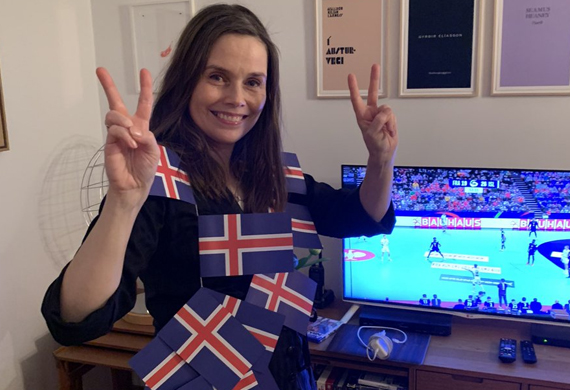
Iceland PM & Women Unite in Historic Strike for Gender Equality
By: WE Staff | Wednesday, 25 October 2023
Iceland recently bore witness to an unprecedented strike where women and nonbinary individuals united to demand equitable pay and an end to gender-based violence. Orchestrated by trade unions, this strike called for participants to abstain from both paid and unpaid labour, encompassing domestic chores. As a result, crucial sectors like public transport and healthcare experienced disruptions. Despite Iceland's considerable strides in the realm of gender equality, a gender pay gap still lingers.
This momentous strike hailed as the most significant since the 1975 event, conveys a potent message against workplace discrimination. In 1975, 90% of Icelandic women refused to partake in work, household cleaning, or childcare to protest against workplace bias. This collective effort bore fruit with the passage of groundbreaking legislation in 1976, guaranteeing equal rights irrespective of gender.
Since then, Iceland has witnessed sporadic strikes and demonstrations, including the 2018 action when women left work early to symbolise the time they, on average, stop earning compared to men.
This time, the strike has particularly impacted educational institutions and the healthcare system, both primarily staffed by women. The repercussions of the strike even extended to the media, with public broadcaster RUV curtailing its broadcasts for the day. Only one bank branch remained operational.
Nationwide demonstrations unfolded, with the capital city, Reykjavik, hosting a massive rally on Arnarhóll Hill. Here, tens of thousands congregated, and speakers emphasized disheartening statistics related to economic inequality and sexual violence in Iceland, questioning whether such conditions could genuinely be termed equal. The crowd responded emphatically with a resounding "No!"
Prime Minister Katrin Jakobsdóttir herself partook in the strike, underscoring the nation's unmet objective of complete gender equality and ongoing struggles to address the gender-based wage gap. Iceland's political landscape reflects a gender-balanced government, with nearly half of the parliamentary members being women. Nonetheless, women remain predominantly engaged in lower-paying occupations like cleaning and childcare, despite their noteworthy breakthroughs into leadership roles.
These lower-paying yet essential occupations, pivotal to Iceland's tourism-dependent economy, often rely on immigrant labour. Approximately 22% of the female workforce in Iceland is foreign-born, a demographic that tends to work extended hours for reduced wages.
The 1975 strike in Iceland, echoing across the globe, sparked similar movements elsewhere. Spain's 2018 strike on International Women's Day drew inspiration from Iceland's historical event, displaying the enduring impact of collective action in the pursuit of gender equality.
Iceland's latest strike reaffirms the nation's unwavering commitment to advancing gender equality and striving for a more equitable society. The unity displayed by women and nonbinary individuals resonates far beyond Iceland's borders, rekindling the call for equality and justice on a global scale.


.jpg)



